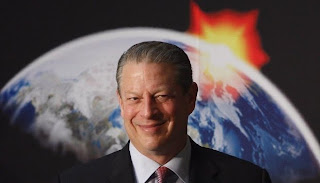
Reference: Low carbon is the economy of the future, Bangkok Post, December 12, 2009
In their hour of desperation, what the rich countries are saying to the poor countries is this: Look, there are just too many of you and if you all end up living high off the hog like we do, there would be way too much carbon dioxide and that would be bad for global warming. So please, stay poor and keep the status quo - with you as the white man's burden and we the all powerful rich, able and willing to take care of you with billions of Euros of aid should global warming devastation strike (Low carbon is the economy of the future, Bangkok Post, December 12, 2009). Unfortunately for the rich, the poor countries are not falling for this line for they know well that if their rate of economic growth is not ambushed by the rich countries' war on carbon dioxide, by the year 2100, when global warming devastation is predicted to strike, they will be rich enough to take care of these problems all by themselves.
What's more, if the rich are serious about committing economic suicide in their vain attempt to control the planet's climate, it is they that will be the poor countries in 2100 freeing up resources for the newly rich; but not to worry, because the newly rich countries of the future will be able and willing to take care of the newly poor and to help them weather the storm of global warming with billions of Bahts, Rupees, and Yuans in aid and assistance.
The message from the poor countries is this: don't keep us poor so that you can take care of us. Let us get as rich as you, so we can take care of ourselves.
Cha-am Jamal
Thailand

















